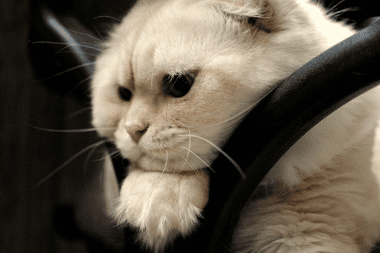Pet care >>>> Old cat in the house
Old cat in the house.

Living with your beloved pet all his life, it is worth thinking about the time when it grows old and begins to deliver many problems that will have to be reckoned with. In an aging pet - a cat - in addition to age-related diseases and disorders of physiological processes, perception disorders, called cognitive dysfunction, develop.
When poor eyesight, poor hearing and poor memory make themselves felt, the animal begins to behave unconventionally. Behavioral signs of aging in cats:
- Disorientation in space - forgets where he goes to the toilet and where he takes food, can wander around the house thoughtlessly in search of a place for the toilet and dirty various unpredictable places. In such cases, it makes sense to stock up on several litter boxes and place them in various places easily accessible to the animal. The sides of the litter box must be made as low as possible, because it may be difficult for your pet to climb over them in old age and for this reason it can choose other places for the toilet or shit next to the litter box.
- Forgets to eat or forgets the place where the bowl is, forgets what he ate and asks for more. For this reason, it is necessary to monitor the food intake of the animal and dose its food.
- Begins to experience anxiety from forgetfulness and not recognizing the place of residence or owners. Do not change the place of residence for the animal in old age, you can also reduce the territory by limiting the movement of the animal to one room or one floor. In this case, install all the amenities in a limited area.
- An animal's anxiety can increase at night, disrupt sleep, which is already sensitive in old age. In order to calm the naughty nervous system of the animal, there are sedatives, which are prescribed by the veterinarian.
- An old cat may stop recognizing household members and experiencing aggression towards them. this fact must be accepted and not require affection from the pet if it is not in a friendly mood, but this does not mean that one should stop paying attention to the animal. Try to attract a cat or dog to play, try to stir them up, but unobtrusively. Increased "bite" can be a sign of poor memory, when the animal does not recognize you and tries to drive away by biting. If the animal, in addition to its poor memory, has poor vision and hearing, then it may be difficult to find contact with it.
In any case of manifestation of cognitive dysfunction in the behavior of an animal, you should contact your veterinarian, since many disorders are treated or maintained in good shape with medication.
Do not deny the animal communication and treatment if it is old. It itself cannot organize its old age.

Read

Read



























